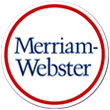sewing machine [1]
Machine used to assemble two pieces of fabric by means of a series of stitches made with a needle and thread.
head 
Vertical section that completes the needle’s drive mechanism; the presser foot extends from it.
needle 
Metal stem that passes the thread through the fabric to form a stitch.
bobbin 
Spool on which the lower thread is wound.
needle plate 
Metal plate with an opening that the needle passes through and two slits from which the feed dogs for the fabric protrude.
slide plate 
Plate that slides open, providing access to the lower stitching components.
tension block 
Parts that control the tension of the upper thread.
flat-bed 
Surface over which the pieces of fabric move.
stitch selector 
Wheel used to select a stitch pattern.
power/light switch 
Button that turns the machine and the sewing light on and off.
column 
Vertical section that supports the arm and houses part of the needle’s drive mechanism.
stitch length regulator 
Dial used to set the length of the stitch; the numbers indicate the length in millimeters.
needle position selector 
Part that selects the needle position (left, center or right).
handwheel 
Dial used to raise and lower the needle manually.
bobbin winder 
Pin on which the bobbin is placed to load it; the spool pin thread is transferred to the bobbin winder.
pressure dial 
Mechanism used to set the pressure of the hinged presser foot on the fabric.
stitch width selector 
Mechanism used to set the stitch width.
arm 
Part that connects the head to the column; it houses part of the needle’s drive mechanism.
spool pin 
Pivot used to attach the upper spool of thread.
thread take-up lever 
Lever that the upper thread goes through before it is threaded through the needle; it regulates tension.
thread guide 
Part used to direct the thread.


![sewing machine [1] image sewing machine [1]](/images/arts-architecture/crafts/sewing/sewing-machine_1.jpg)

![sewing machine [1] image sewing machine [1]](/images/arts-architecture/crafts/sewing/sewing-machine_1.jpg)




